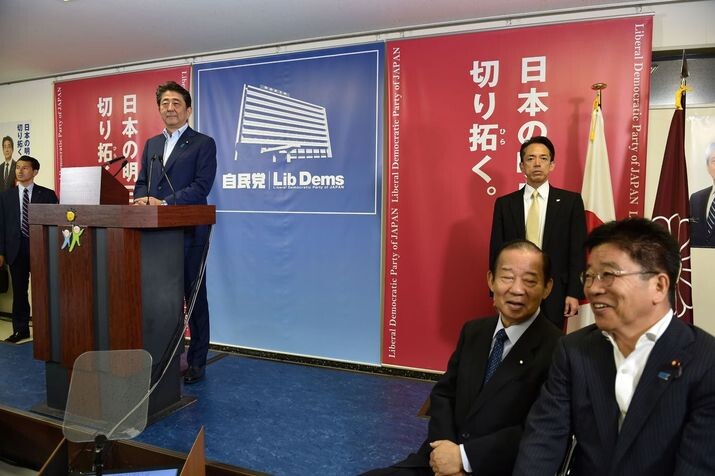hankyoreh
Links to other country sites 다른 나라 사이트 링크
[Editorial] It’s Abe that needs to provide a “decent answer,” not South Korea

In a series of interviews with the press on July 21 and 22, following the election for seats in Japan’s House of Councillors, or Upper House, Japanese Prime Minister Shinzo Abe said that “there won’t be constructive discussion until South Korea comes up with a decent answer” and that “South Korea needs to be first to provide an answer.” This appears to reconfirm that, even after the election, Abe is continuing to pin the blame for the two countries’ dispute on South Korea, without any intention of actually resolving the issue. It’s highly regrettable that Abe continues to disregard the South Korean government’s repeated proposals for diplomatic deliberations and is rudely pressuring South Korea to make one-sided concessions. The time has come for Abe to take seriously the results of an election in which he failed to secure the supermajority needed to table a constitutional amendment. He should also desist from his line-crossing political and diplomatic onslaught.
The Blue House turned Abe’s remarks on their head by saying, “This raises the question of whether South Korea has ever failed to provide a decent answer.” While South Korea has left open the option of additional negotiations by offering the “1+1” plan for South Korean and Japanese companies to donate money to cover the damages for victims of forced labor awarded by South Korea’s Supreme Court, Japan hasn’t made any response to that. Abe needs to recognize that the government that needs to offer a “decent answer” isn’t South Korea’s, but Abe’s own administration.
The Abe administration rehashed its ludicrous argument that its export controls “aren’t punitive, because we’re reviewing our operation [of export management] for security purposes.” But multiple reports have confirmed that South Korea enforces the Wassenaar Arrangement and other multilateral regimes for controlling the exports of strategic weapons even more strictly than Japan. While the South Korean government has proposed having an international body assess their respective management of strategic weapons, Japan has rejected the proposal.
Abe has furthermore argued that “the greatest issue in South Korea-Japan relations is whether promises between states will be kept. South Korea failed to abide by an international treaty when it unilaterally violated its claims agreement with Japan.” Abe went on to say that Japan “will be straight up with South Korea after a proper trusting relationship has been built.” It’s already absurd to argue that a Supreme Court decision recognizing the individual right to make claims represents a “broken promise,” and the remarks about “building a proper trusting relationship” are just smoke and mirrors. For South Korea and Japan to build trust, they need to engage in dialogue.
It’s shameful that Abe has voiced his intention to continue trade retaliation with these flimsy
arguments even after the election in the House of Councillors. The time has come for Abe to reflect on who will benefit from such a disruption in the free trade order.
Please direct comments or questions to [english@hani.co.kr]

Editorial・opinion
![[Editorial] Korea must respond firmly to Japan’s attempt to usurp Line [Editorial] Korea must respond firmly to Japan’s attempt to usurp Line](https://flexible.img.hani.co.kr/flexible/normal/500/300/imgdb/original/2024/0514/2317156736305813.jpg) [Editorial] Korea must respond firmly to Japan’s attempt to usurp Line
[Editorial] Korea must respond firmly to Japan’s attempt to usurp Line![[Editorial] Transfers of prosecutors investigating Korea’s first lady send chilling message [Editorial] Transfers of prosecutors investigating Korea’s first lady send chilling message](https://flexible.img.hani.co.kr/flexible/normal/500/300/imgdb/original/2024/0514/7917156741888668.jpg) [Editorial] Transfers of prosecutors investigating Korea’s first lady send chilling message
[Editorial] Transfers of prosecutors investigating Korea’s first lady send chilling message- [Column] Will Seoul’s ties with Moscow really recover on their own?
- [Column] Samsung’s ‘lost decade’ and Lee Jae-yong’s mismatched chopsticks
- [Correspondent’s column] The real reason the US is worried about Chinese ‘overcapacity’
- [Editorial] Yoon’s gesture at communication only highlights his reluctance to change
- [Editorial] Perilous stakes of Trump’s rhetoric around US troop pullout from Korea
- [Guest essay] Preventing Korean Peninsula from becoming front line of new cold war
- [Column] The state is back — but is it in business?
- [Column] Life on our Trisolaris
Most viewed articles
- 1Ado over Line stokes anti-Japanese sentiment in Korea, discontent among Naver employees
- 2[Column] Samsung’s ‘lost decade’ and Lee Jae-yong’s mismatched chopsticks
- 3Korean opposition decries Line affair as price of Yoon’s ‘degrading’ diplomacy toward Japan
- 4US has always pulled troops from Korea unilaterally — is Yoon prepared for it to happen again?
- 5Korean auto industry on edge after US hints at ban on Chinese tech in connected cars
- 6[Editorial] Yoon’s gesture at communication only highlights his reluctance to change
- 7[Correspondent’s column] The real reason the US is worried about Chinese ‘overcapacity’
- 8[Column] Will Seoul’s ties with Moscow really recover on their own?
- 9[Photo] Korean students protest US complicity in Israel’s war outside US Embassy
- 101 in 3 S. Korean security experts support nuclear armament, CSIS finds